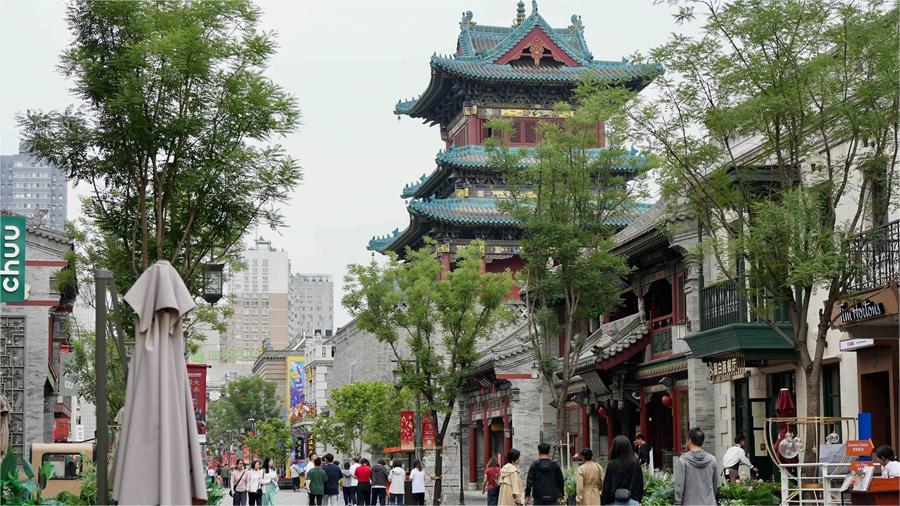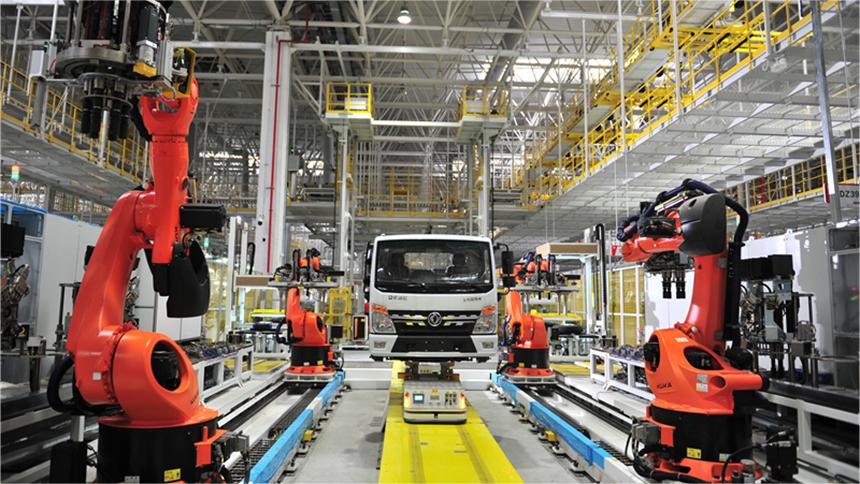African agriculture thrives with Chinese technology, market access
* In recent years, agricultural cooperation between China and Africa has flourished under the frameworks of the Forum on China-Africa Cooperation and the Belt and Road Initiative.
* From local fields to global e-commerce platforms, China's efforts have significantly boosted African agricultural productivity and modernization through technical assistance, industry chain development, and market access.
* Platforms such as the China International Import Expo, the China-Africa Economic and Trade Expo, and the African Goods Online Shopping Festival have become crucial showcases for African agricultural products, enhancing their international visibility.
NAIROBI, June 18 (Xinhua) -- At the Nigerian Agricultural Technology Demonstration Center near Abuja, the capital of the West African country, Chinese agricultural experts have a daily routine of examining newly harvested rice.
As a result of years of dedicated work, experts from the Chinese company Green Agriculture West Africa Ltd. (GAWAL) have developed a high-yield rice seed tailored to local conditions, which outperforms native varieties by over 20 percent. This seed, endorsed by Nigerian agricultural authorities, is now planted across two-thirds of the country's states.
Lawal Musa, a farmer from Jigawa State, has been growing this rice for several years. "Rice is vital in Nigeria and every family consumes it. With China's cooperation, Nigeria is on the path to achieving food self-sufficiency," he said, praising the rice for its high productivity and ability to withstand diseases and drought.
GAWAL, a leading seed company in Nigeria, contributed to the government's seed supply program by distributing over 30,000 tons of seeds across more than 30 states. Its effort has significantly boosted the country's rice production by more than 2 million tons.
In recent years, agricultural cooperation between China and Africa has flourished under the frameworks of the Forum on China-Africa Cooperation and the Belt and Road Initiative. From local fields to global e-commerce platforms, China's efforts have significantly boosted African agricultural productivity and modernization through technical assistance, industry chain development, and market access.
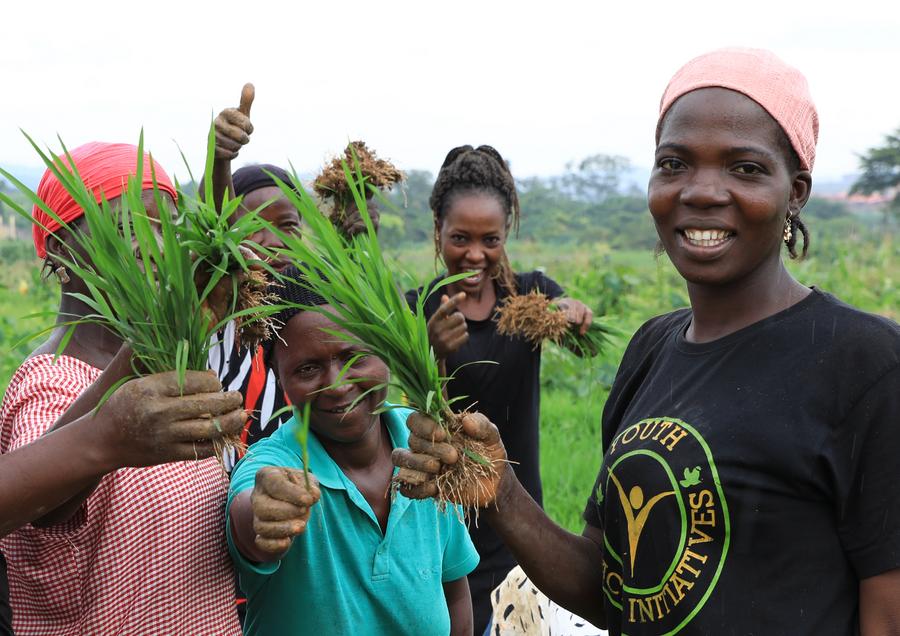
Local employees display rice seedlings at the Nigerian Agricultural Technology Demonstration Center near Abuja, Nigeria, Sept. 19, 2023. (Xinhua/Dong Jianghui)
TRANSFERRING TECHNIQUES TO LOCAL FARMERS
Over the past decade, the Nigerian Agricultural Technology Demonstration Center has stood out among the 24 centers established by China across Africa. These centers are pivotal in advancing agricultural technology, successfully transferring over 300 sophisticated agricultural techniques to local farmers.
The impact of these initiatives is substantial, boosting crop yields by 30 percent and positively affecting over 1 million smallholder farmers throughout Africa.
With concerted efforts, Chinese agricultural specialists have remarkably improved the yield and quality of staple crops such as rice, cassava and soybeans. Moreover, they have introduced an array of new fruit, vegetable, and bean varieties. These contributions have not only enriched the diversity of African diets but also forged fresh pathways for the region's agricultural progress.
In Kigali, Rwanda, Leonidas Mushimiyimana operates the region's largest mushroom cultivation workshop, producing up to 30,000 mushroom tubes monthly and 600 kilograms of fresh mushrooms weekly.
Juncao is a hybrid grass and an important multifunctional agricultural resource developed and used for mushroom farming in China.
After learning the Juncao cultivation technology, Mushimiyimana established the workshop, employing dozens of people. He plans to expand his business to produce dried mushroom products for international markets, fostering communal prosperity.
Juncao technology now benefits over 4,000 Rwandan farmers, creating more than 30,000 jobs along the agricultural value chain.
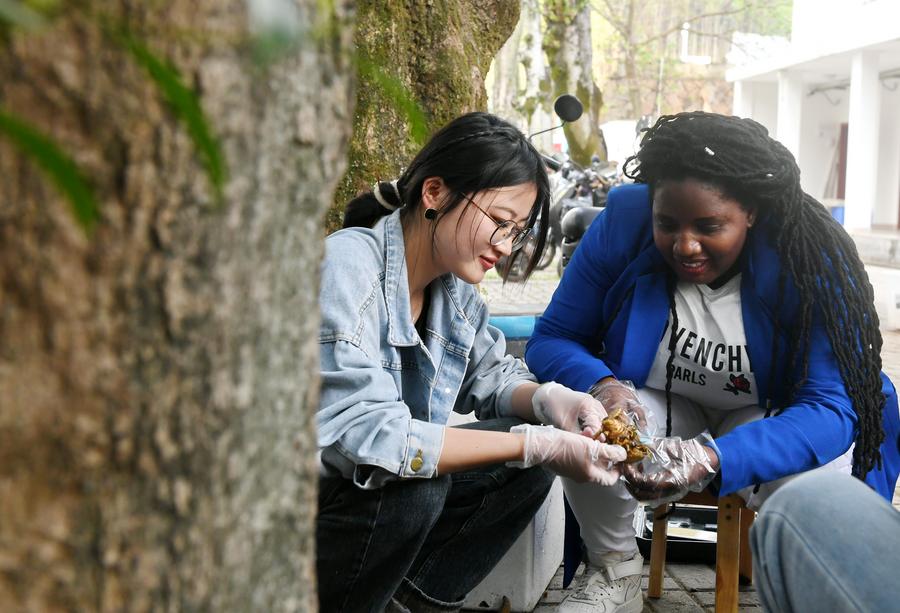
Media (R) from Rwanda learns about Juncao from a Chinese student in the national engineering research center of Juncao technology at Fujian Agriculture and Forestry University in Fuzhou, southeast China's Fujian Province, March 28, 2024. (Xinhua/Lin Shanchuan)
Eric Rokasse Kamo, former minister of agriculture and rural development of the Central African Republic, lauds the practicality of Juncao technology, highlighting its role in job creation and income enhancement for the African people.
ENHANCING VALUE-ADDED PRODUCTS
China-Africa agricultural cooperation extends beyond the fields, encompassing the entire industrial chain to enhance the processing capacity and added value of African agricultural products, thereby increasing farmers' incomes.
During Cote d'Ivoire's rubber harvesting season, trucks queue up outside the Mainland Group's rare rubber factory in Dabou. The newly harvested rubber will be processed into standard rubber at this Chinese factory before being shipped to China for further processing into rubber products.
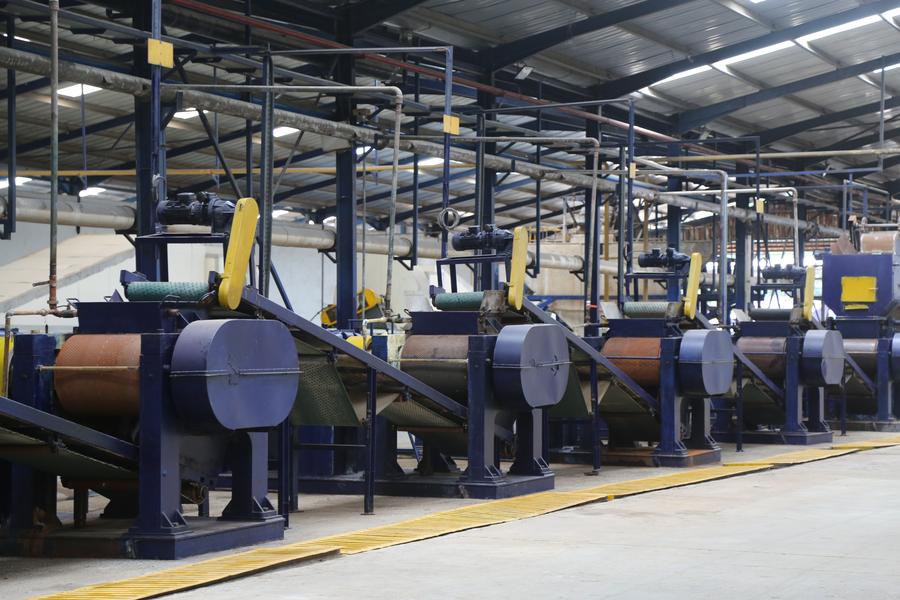
This photo taken on June 10, 2024 shows the machines in the Mainland Group's rare rubber factory in the suburbs of Dabou, a town in southern Cote d'Ivoire. (Xinhua/Zhang Jian)
Despite its favorable natural conditions as Africa's largest natural rubber producer, Cote d'Ivoire's lack of processing capacity limited its exports in the past.
Yobouet Roland, a local cooperative member, noted that Chinese factories have doubled their production by providing new sales channels.
Brou Bonaventure, from the Ivorian Interprofessional Fund for Agricultural Research and Advice, said the Chinese factory has boosted local processing capacity and provided fair, stable shipping channels, facilitating farmers to expand their rubber production.
"The Chinese factory has increased the value of our rubber products. We are grateful to China!" Bonaventure exclaimed.
Cassava, a crucial food crop in Africa, has also seen advancements. Poor varieties and technical limitations hindered yield and processing previously.
During a training session by the Chinese Academy of Tropical Agricultural Sciences (CATAS), agricultural officials from South Africa, Nigeria, Uganda, and the Republic of the Congo were amazed to learn cassava starch could be processed into products like cookies, yogurt, cakes and noodles.
In Nigeria, GAWAL and CATAS have jointly established a modern agricultural demonstration base in Abuja, featuring a small-scale cassava starch processing line and a 10-acre high-yield demonstration base. Local training in cassava cultivation and processing has been held there.
Wang Yun, GAWAL's general manager, said that the base will continue training in cassava seedling cultivation, planting and processing to extend the entire cassava industry chain.
ACCESS TO BIGGER MARKETS
In early mornings, freshly harvested rose petals still adorned with dewdrops could be seen at Kenya's Tambuzi Limited. Within 48 hours, these flowers will reach the shelves of the Hunan Gaoqiao Grand Market in Changsha, China, ready for purchase by Chinese customers.
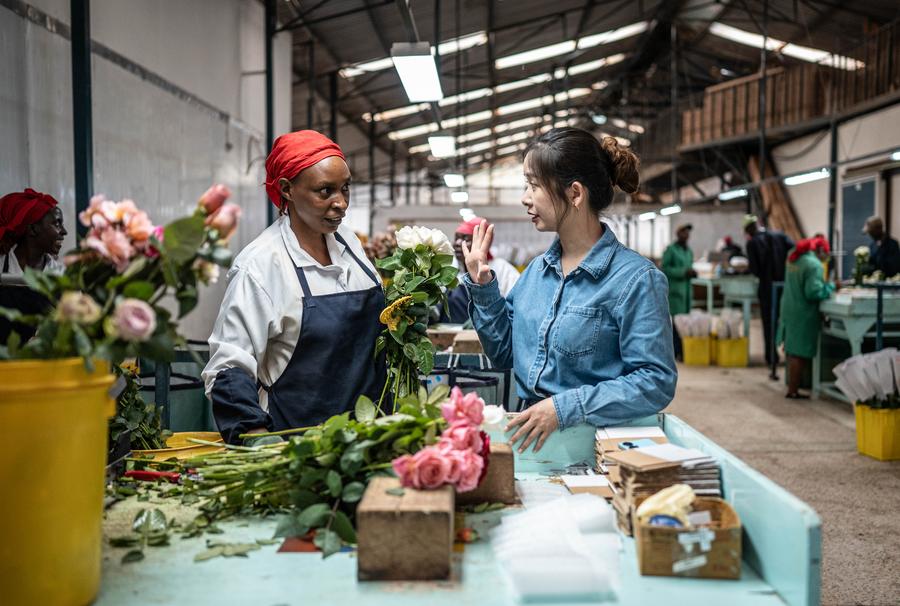
Huang Zinan (R), chairwoman of Hunan Xiyue Culture Media Co., Ltd., selects flowers at a factory of Tambuzi Limited, in Nanyuki, Kenya, May 18, 2024. (Xinhua/Wang Guansen)
Kenya, a major global exporter of fresh flowers, used to face challenges in accessing new markets due to high tariffs and complex regulations.
However, China's "green channel" for African agricultural products has expedited inspection and quarantine processes and expanded tariff exemptions, benefiting Kenya's flower industry and other African agricultural products like avocado, citrus, pineapple and coffee.
Huang Zinan, chairwoman of Hunan Xiyue Culture Media Co., Ltd., said her company, which cooperates with seven Kenyan flower farms including Tambuzi, sells 100,000 flowers monthly across 14 Chinese cities and exports to Russia and Australia.
Huang noted the significant demand of the Chinese market for high-end and rare flower varieties. She envisioned developing derivative products such as essence oils and floral water to enhance the market competitiveness of Kenyan flowers, boosting local employment and increasing flower farmers' incomes.
As of June 2023, 16 agricultural products from 11 African countries have accessed China through the "green channel," with more African specialty commodities entering the Chinese market.
China's trade promotion measures have rapidly increased Africa's agricultural exports to China, making China Africa's second-largest agricultural export destination.
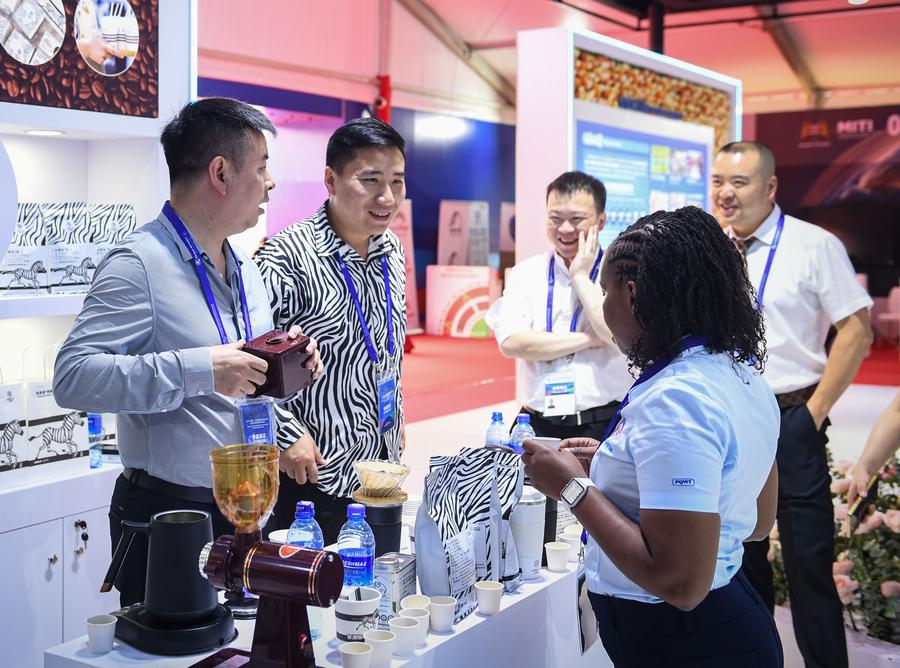
A coffee exhibitor shows coffee products during an exhibition of the China-Africa Economic and Trade Expo in Nairobi, Kenya, May 9, 2024. (Xinhua/Li Yahui)
Platforms such as the China International Import Expo, the China-Africa Economic and Trade Expo, and the African Goods Online Shopping Festival have become crucial showcases for African agricultural products, enhancing their international visibility.
"Imagine a small coffee-growing village in Africa connecting directly with the global market. This village could finally break free from poverty," said Laila Lokosang, a senior technical advisor at the African Union.
Photos
Related Stories
- China hopes U.S. will do something concrete for Africa's development: spokesperson
- UN chief calls for African role in global peace and security architecture
- In pics: internally displaced persons camp in eastern DRC
- AU appoints special envoy to combat genocide, mass atrocities in Africa
- 37th AU summit begins in Addis Ababa with focus on education, development
- In pics: handicraft market in Abidjan, Cote d'Ivoire
- Amazigh New Year celebrated in Algiers
Copyright © 2024 People's Daily Online. All Rights Reserved.






